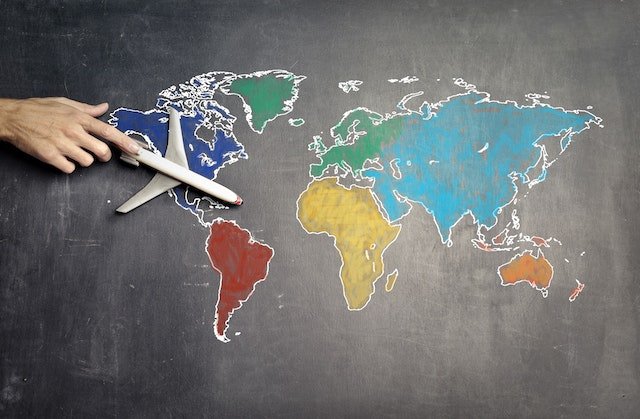
Tips
for Moving Abroad with Kids
Embarking on the journey of international move with kids is a thrilling chapter brimming with potential and adventure. However, it comes with its unique challenges and calls for meticulous planning. This guide highlights crucial areas and offers practical strategies for a smooth transition. Navigating this significant life shift doesn’t have to be overwhelming. With the right preparation, moving abroad with kids can be a stress-free and enriching adventure for the entire family.

Understanding the Challenges of Moving Abroad with Kids
Moving internationally with kids presents various emotional challenges that should not be overlooked. While starting fresh in a new country can be exciting, it may also be daunting and frightening for children. They might experience a sense of loss or anxiety, having to leave familiar surroundings, friends, and routines. Disruptions to their daily habits could further amplify their discomfort and insecurity.

Preparing your Children for the Move
Keeping an open line of communication is paramount when preparing your kids for the move. Discussing the impending change, including why it’s happening, what it means, and what they can expect, can help alleviate their anxiety.
Involve kids in moving by letting them pack their items or research their new home, creating a sense of control and involvement. At the same time, it’s an excellent opportunity to pare down your items, effectively downsizing before packing. This process can help you identify what is essential and make the move more manageable. To foster a positive outlook about the new country, expose them to its culture using resources like books, movies, or language learning apps. Familiarizing them with local customs, traditions, and language can transform uncertainty into anticipation. In addition, ensuring continuity in education is essential. Reach out to your children’s prospective schools in advance to understand the curriculum and determine how to bridge any gaps. That will allow your children to transition academically with ease and confidence.
Moreover, dealing with cultural shock after moving abroad can present substantial barriers, especially for kids. Cultural and language differences can feel overwhelming, often making it challenging for children to communicate effectively with peers, potentially leading to feelings of isolation. Similarly, adjusting to new educational systems and curriculums can be a considerable struggle for them. Be aware of these potential obstacles and provide guidance and support to help your children navigate these changes effectively.
Practical Tips for Moving Abroad with Kids
Organizing documentation is the first and most crucial step when preparing for your move. Ensure that passports are up-to-date and all necessary visas have been obtained for each family member. Keep digital and hard copies of important documents, including birth certificates, medical and school records. These documents are not only necessary for the transition but are also typically required when enrolling your kids in a new school.
Choosing the right neighborhood and school affects the family’s overall well-being. Consider the proximity to schools, safety, amenities, and the presence of other expat families. Visit prospective schools, if possible, to get a feel for the environment, the teaching methodology, and the school community.
Planning your travel route is another important step. Try to minimize long layovers or unnecessary stops, which can exhaust kids and increase stress. When packing, involve your children and encourage them to pack a small bag with their favorite toys, books, or comfort items. These familiar items can provide security and comfort in a new and unfamiliar environment. Additionally, NYC Mini Storage advises using storage facilities for items you might not need immediately. That can reduce clutter and make settling into your new home less overwhelming.
Adjusting to the New Environment
Encouraging your kids to explore their new surroundings can help them feel more comfortable at home. Plan outings to local parks, museums, and other attractions. Allow them to discover the beauty and uniqueness of their new home, fostering a sense of belonging and enthusiasm. Simultaneously, maintaining a consistent routine is crucial to give your children a sense of stability amidst the sea of change. Keeping some parts of their day predictable can provide immense comfort, whether bedtime rituals, meal times, or homework routines.
In addition, emphasize understanding and respecting the new culture. Encourage your kids to learn about local traditions, holidays, and customs. That will not only help them to integrate but also foster a broader, more inclusive worldview. Supplement this with learning the local language. That could mean enrolling them in language classes or using language learning apps, which can make this process engaging and fun. Language competency will significantly enhance their social interactions and experience in the new country.

Supporting your Kids Post-Move
Post-move, it’s crucial to keep a keen eye on your children’s emotional well-being. Changes in behavior, mood, or academic performance can indicate stress or difficulty adapting. Encourage them to express their feelings and reassure them that it’s normal to experience a wide range of emotions during this time. Keep an open line of communication and consider seeking professional help if necessary.
Encouraging social interactions can also play a significant role in their adjustment process. Promote participation in extracurricular activities, clubs, or community events to help them make new friends. Addressing homesickness is equally important; facilitate regular contact with friends and family back home through calls or video chats. While supporting them emotionally, don’t forget the practical side and all you should know about moving insurance to safeguard your belongings during the transit. Lastly, closely monitor their academic progression. Maintain regular contact with their teachers to ensure they adapt well to the new curriculum and classroom environment.
Conclusion
Moving abroad with kids can be rewarding, provided the challenges are well-understood and adequately managed. By maintaining open communication, preparing ahead, and providing continuous emotional support, you can ensure a smooth transition for your family. Remember, with patience, empathy, and a well-devised plan, this significant life change can become an enriching experience that contributes to your children’s growth and resilience.


























